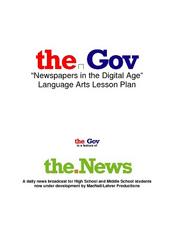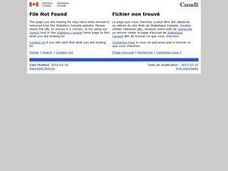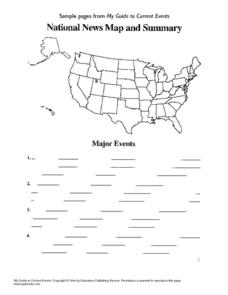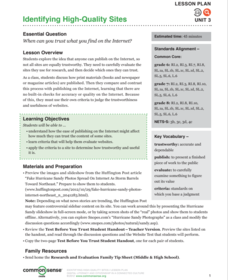Curated OER
Asking the Right Questions
Students explore interviewing skills. In this journalism instructional activity, students examine "good" and "bad" interview questions and discuss both. Students then practice interviewing partners in the classroom.
Curated OER
Power and Impact of Radio as a Broadcast Medium
Students compare radio coverage of news events with coverage of 21st century new stories. They analyze various forms of media as they relate to news coverage. They write an essay comparing the impact of radio versus that of television
Curated OER
Beneath the News: Who's Doing What to Whom, and Who Cares?
Students investigate the differences between various forms of media (print, radio, TV, Internet). They determine the target audience for each and compare exposure around the world. They write a short story and share it with the class.
Curated OER
Finding and Authenticating Online Information on Global Development Issues
Students discover how to find authoritative resources. For this research skills lesson, students examine strategies for using the Internet effectively to research global development issues.
Curated OER
That Is Not My Opinion!
Being an informed citizen requires distinguishing fact from opinion and understanding persuasion methods. Secondary learners evaluate newspaper editorials. They read opinion pieces, identify the writer's purpose and position on an issue,...
Curated OER
Newspapers in the Digital Age
Is journalism more or less reliable with the influx of Internet sources? Learners investigate the issues of freedom of speech, journalistic ethics, and social responsibility in the age of Twitter and Facebook. After examining the...
Curated OER
Nellie Bly's Newspaper Club: Introducing the Art of Writing
Students use video and the Internet to research the life of Nellie Bly, a famous female reporter from the 19th century. They research a writer and present their information to the class in the style of a news reporter.
Curated OER
Combing Through the News
Students use the Sean 'Puffy' Combs trial to compare how and why various media cover a news story differently.
Curated OER
Writing a Newspaper-Style Article
Help your secondary reader/writers assess texts by studying press releases from Statistics Canada and drafting articles based on them. They then compare the press release, their own articles, and actual news stories they find online. I'd...
The New York Times
'The Century's Bitterest Journalistic Failure'? Considering Times Coverage of the Holocaust
Rich with primary sources and additional resources, this plan asks class members to think critically about newspaper coverage of the Holocaust. Focusing in particular on the analysis of the article "150th Anniversary: 1851-2001: Turning...
ReadWriteThink
Persuasive Techniques in Advertising
Help your 21st century learners develop their media smarts with this resource that has them examine the persuasive techniques advertisers use to influence specific demographics and then to use these techniques to craft their own ads.
Curated OER
Pass This Jobs Bill
It seems that print media is slowly being replaced by electronic versions. Get your kids reading the New York Times e-style. They'll read the provided article entitled, "Pass This Jobs Bill" then answer six comprehension questions. Two...
Facing History and Ourselves
How Journalists Minimize Bias
Class members are challenged to write a neutral news story about the events they observe in a short video. After sharing their stories in groups and discussing the different perceptions, the class concludes with a video of journalists...
Curated OER
Case Studies in Journalistic Ethics - Number 3
Learners investigate ethical decision making when using photos in journalism. In this ethics in journalism lesson plan, students read about the ethical use of images in media, discuss recent controversial photos, and look at online case...
Curated OER
Journalists Under Fire
Students examine journalism in extreme conditions. In this war-zone journalism lesson, students research media coverage of Vietnam, Grenada, the Gulf War, and military actions in Somalia and Kosovo. Students compare coverage in the past...
Curated OER
Walter Cronkite: Witness to History
Students brainstorm a list of news sources. They interview people about today's media and discuss their results. After watching segments of a film about Walter Cronkite, they role play as reporters and subjects from an historic period...
Educators Publishing Service
My Guide to Current Events
Keep your youngsters abreast of current events with these activity worksheets! Or, consider what historical events throughout early American history would have looked like on a national newspaper? Your young historians will become...
PBS
What Makes A Good Video Report?
As part of a media literacy unit, class members establish criteria for good video reporting, and practice giving both positive (warm) and constructive (cool) criticism.
Curated OER
Fact vs. Opinion (Part II)
How can you tell the difference between fact and opinion? Using newspapers, learners determine which articles contain statements of fact, and which articles reflect the writer's opinion. The lesson plan includes a discussion format and a...
Curated OER
"Journalism in Tennessee"
High schoolers listen to headline from National Enquirer or other tabloid, listen to story "Journalism in Tennessee," compare and contrast connections between Twain's idea of journalism with present day journalism, define vocabulary, and...
Curated OER
Editorial Writing: What's On Your Mind
Students write an editorial column for a newspaper. For this journalism lesson, students discuss and analyze editorials in print and broadcast media. Students will compare the differences in these two formats of editorial pieces and then...
Common Sense Media
Identifying High-Quality Sites
Use a Huffington Post article focused on false pictures of Hurricane Sandy to launch a discussion about the reliability of online information. Groups compare and contrast how print and broadcast media regulate data gathering with the...
Curated OER
Conversation Lesson: News
In this conversation lesson worksheet, 7th graders use context clues to get the meaning of 8 words, then select 6 news stories from a list of 12 and explain why they would choose those for an evening TV news broadcast.
PBS
Copyright and Fair Use
When is using someone else's copyrighted material appropriate? Learn about copyright and fair use with a lesson from PBS.org. Scholars read through a reference sheet about authors' rights and users' rights, and then create posters for a...

























